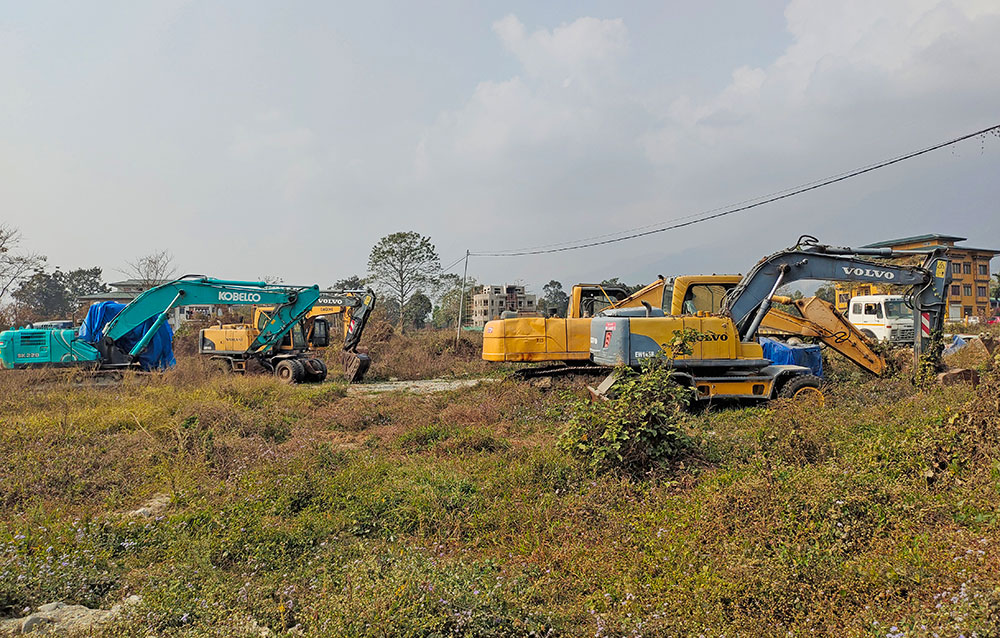… construction industry awaits resurgence
Lhakpa Quendren
Setu Bahadur Gurung, the proprietor of T.N.G Construction in Gelephu, has revitalised two long-idle JCBs for the Gelephu International Airport development project.
These machines, dormant for almost two years due to the adverse impacts of the Covid-19 pandemic, found a new purpose in the airport venture, sparing his construction company from prolonged inactivity.
Expressing relief, Setu Bahadur Gurung said, “If not for the airport development project, my machines would have remained idle. Even though I don’t have loans to repay, it was a great relief for the construction companies.”
For the last five months, six JCBs, including Setu Bahadur Gurung’s, have been actively engaged in clearing about 1,800 acres of land, marking substantial progress toward the total clearance goal of 2,500 acres.
The clearing initiative commenced in Samtenling and has extended to the opposite side of the Workshop in Gelephu thromde.
Manber Tamang, a JCB operator with a 15-year tenure in the same construction company, emphasized the positive impact of this newfound activity. “Without work, it is challenging for both the employees and the owners,” he said.
The post-pandemic period was particularly arduous, with a scarcity of construction projects leading to reduced working days, affecting both workers and employers in the sector.
Anticipating a positive turn, contractors in Sarpang, where some construction machinery remains idle, are optimistic about the opportunities presented by the upcoming Gelephu project.
Tobden Construction’s proprietor Chencho Gyeltshen highlighted the immense potential of the Gelephu city development project to drive growth in the construction industry, stating, “I believe construction firms can play a pivotal role in contributing to this economic development endeavor.”
“The development project will have a lasting impact on the local construction industry, including safety and timing, which we are currently lacking,” he added, emphasising the creation of job opportunities and the fostering of innovation in construction techniques and technologies.
Chencho Gyeltshen said the Gelephu Mindfulness City is the only hope for returning to normalcy. “Almost all the construction companies in Gelephu and Sarpang have remained idle for about 10 months now.”
“We have been sustaining ourselves because of the loan deferment measures. Otherwise, we would have faced bankruptcy,” he added. “If it were not for the upcoming development project in Gelephu, we would have to request another deferment.”
In addition, the ongoing construction moratorium in Sarpang, initiated in May 2023, has also impacted construction companies in Gelephu.
Currently, the construction of buildings or sheds using cement and concrete bricks is prohibited.
An equipment rental contractor said that around seven of his chain excavators have remained without work for about two years, with some machinery now rusting due to prolonged inactivity.
In Gelephu, there are about 30 construction companies, including six large-class established construction firms.
CAB prepares
The President of the Construction Association of Bhutan (CAB), Tashi Wangyal (PhD), said numerous discussions have occurred with stakeholders and contractors to ensure their readiness to serve whenever called upon.
“We are also working on our abilities and positioning to serve His Majesty’s grand vision of Gelephu Mindfulness City, which can absorb every single construction firm and subsidiary company.”
As for the Gelephu Mindfulness City development, Tashi Wangyal believes the construction industry is crucial in terms of relevance. “We are positive we can deliver and look forward to serving in building our national infrastructures.”
“I always urge fellow contractors to upgrade skills, build capacity, and use this lean time to improve ourselves, worthy of taking up projects and delivering as envisioned by our King,” Tashi Wangyal said. “We must prioritise quality enhancement and time management in all aspects.”
The president also said that lean periods for the construction sector tend to occur during planning and government transition times, as all registered construction firms rely on government capital expenditures for projects.
Also, the construction industry across the country has been affected by a moratorium imposed on construction by the Central Bank because of the stretched foreign reserve limits at the moment.


